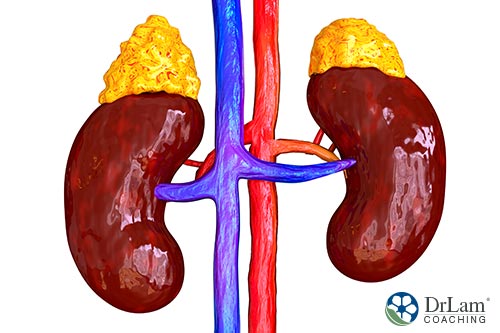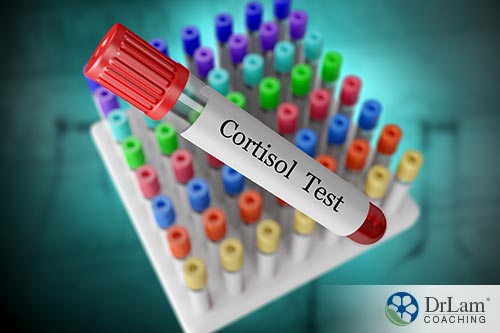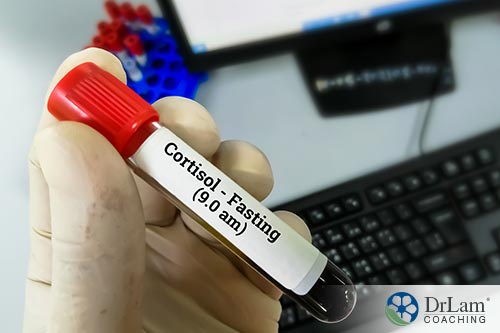
The adrenal glands have been getting a lot of press lately. This often-ignored part of the body produces cortisol during times of stress and when something goes wrong, it can cause a whole range of symptoms and problems. That’s why so many medical sources are starting to talk about the importance of adrenal health and the dangers of adrenal problems. If you have low energy levels or other symptoms that indicate something may be wrong with your adrenal glands, then your doctor will probably order a cortisol test. This test will help your doctor identify any problems, so they can work with you to create a recovery plan. However, having a cortisol test isn’t as simple as getting your blood tested and receiving straightforward results and a pathway to recovery.
The results of cortisol testing can be an indication that something is wrong. And what it means is that you will need to undergo multiple tests. During this process, you need to understand what’s happening, how to get the most reliable results, and how to understand those results.
Here’s a complete rundown on cortisol testing and what to expect during this process.
 Cortisol is a hormone created by your adrenal glands. These are two tiny glands above the kidneys and this hormone has essential roles in just about every tissue and organ in your body.
Cortisol is a hormone created by your adrenal glands. These are two tiny glands above the kidneys and this hormone has essential roles in just about every tissue and organ in your body.
Cortisol helps with:
Cortisol is the hormone responsible for the so-called fight or flight response. When you’re stressed or under threat, the adrenal glands release this hormone to help protect you from the cause of the threat and to prepare you to respond to it. As a result, high cortisol levels give you lots of energy and shut down or slow down non-essential functions like digestion, elimination, and fertility.
It's also possible to have low cortisol levels. Abnormally low levels can be just as problematic and indicative of a deeper issue as high levels. This is where a cortisol test comes in. There are a few different types of cortisol tests out there and each of them measures the levels of this hormone in different parts of your body.
Your doctor may order a cortisol test to identify any problems or diseases that are affecting your adrenal glands or pituitary gland. Your pituitary gland is located in the brain and one of its chief duties is to signal the adrenals to release cortisol. So if something goes wrong with your cortisol levels, then the health and function of the pituitary must be examined as well.
Abnormal cortisol levels can mean high or low levels of the hormone. Both high and low levels can cause troubling symptoms or be a sign of specific disorders. Either way, you will need to visit your doctor for a test. Here’s some more information on cortisol levels:
If you have abnormally high cortisol levels, then you may experience general symptoms such as:
If your body makes too much cortisol over a long period of time, then it’s known as Cushing Syndrome. Cushing Syndrome is often caused by steroid drugs, but it can also occur because of problems with the adrenal glands. Symptoms of Cushing’s Syndrome include:
 Low cortisol levels can be just as troubling. This is known as Addison disease, and it occurs to all sexes and in all ages. If left uncorrected, it can be life-threatening and is often coupled with low levels of a hormone called aldosterone. Symptoms of this disorder often develop slowly, over time, and can include:
Low cortisol levels can be just as troubling. This is known as Addison disease, and it occurs to all sexes and in all ages. If left uncorrected, it can be life-threatening and is often coupled with low levels of a hormone called aldosterone. Symptoms of this disorder often develop slowly, over time, and can include:
Another condition known as adrenal crisis also causes dangerously low cortisol levels. This condition can be life-threatening, so it needs to be identified and corrected as soon as possible. Some of the symptoms associated with adrenal crisis include:
You won’t need to fast before your cortisol test, but it will need to be performed at certain times of the day to catch the highs and lows of this hormone. You may also have to refrain from taking certain medications that affect cortisol levels such as:
There are also other factors that can affect your cortisol levels. Pregnancy for example tends to increase your cortisol levels, so your doctor will advise you on what to do if you’re pregnant. Stress also affects your cortisol, so try to relax, rest, and avoid stress as much as possible before your test.
A cortisol test measures the level of this hormone in urine, saliva, or blood. However, a blood test is the most common method for identifying a problem with your cortisol levels. Here’s what to expect when you go in for your test:
 When you have a blood test, you will need to go in for testing twice as cortisol levels change throughout the day. Testing is usually performed in the morning when your cortisol levels will be at their highest and around 4pm when they should be much lower. You can go to a doctor for testing or get an at-home test in some areas.
When you have a blood test, you will need to go in for testing twice as cortisol levels change throughout the day. Testing is usually performed in the morning when your cortisol levels will be at their highest and around 4pm when they should be much lower. You can go to a doctor for testing or get an at-home test in some areas.
Here’s what a cortisol blood test is like:
There are very few risks to having a blood test. Most people only experience some bruising at the site. However, in some cases blood tests can cause:
If you have a urine cortisol test, then the procedure will be a little different. For this test, you will have to collect all the urine you produce for 24 hours. This measures how your cortisol levels vary during the day. You will be given containers and detailed instructions on how to perform this test. Here’s a general idea of how to do it:
The urine test is totally safe, with no known side effects, but can be a little disruptive to your schedule.
A saliva test is usually performed multiple times throughout the day. There’s a special kit that your doctor will give you for this test and they will tell you what times to perform it. Here’s how to perform it:
There are no known side effects or consequences from this test.
 Every laboratory measures the results of cortisol tests differently, so what’s considered normal when it comes to your test will vary. However, generally speaking, if you have a test first thing in the morning, then your cortisol levels should be between 6 and 23 micrograms per deciliter (mcg/dL).
Every laboratory measures the results of cortisol tests differently, so what’s considered normal when it comes to your test will vary. However, generally speaking, if you have a test first thing in the morning, then your cortisol levels should be between 6 and 23 micrograms per deciliter (mcg/dL).
Both high and low cortisol levels are considered abnormal. However, it doesn’t mean that you will automatically need medication or other medical interventions if your levels are abnormal. There are a range of factors that can cause high or low cortisol levels including:
So, if your levels are abnormal, then your doctor will need to do more tests to find out exactly what’s wrong, if anything, before taking any further steps. Other tests that your doctor may recommend include:
These tests will give your doctor a more complete picture of what’s happening with your adrenal glands. And this is essential for determining the next step forward. Here are some of the issues that can cause abnormal results:
A cortisol test is a very important step when you have Adrenal Fatigue Syndrome (AFS). AFS occurs when ongoing stress causes overwork and eventually damage to the adrenal glands. Cortisol testing can help identify both of these stages of AFS.
When you’re in the early stages of AFS, it means that you’re constantly stressed. When you’re under stress, the NeuroEndoMetabolic (NEM) stress response activates. This causes changes throughout the body that make you alert and ready to face the cause of the stress. These changes also help protect you from damage. The NEM brings about these changes by prompting the adrenal glands to produce more cortisol. So, if you have a cortisol test while you’re in these stages, your levels may be higher than normal, perhaps even abnormally high depending on your body and your stress tolerance.
The NEM stress response is only designed to be active for short periods. When you’re stressed long-term, as too many people seem to be in the modern world, the adrenal glands start to fatigue. They struggle to produce the cortisol levels that your body is demanding, and levels may drop. If you have your cortisol levels tested at this stage, you may have abnormally high levels of the hormone or low levels. It all depends on how far the adrenal dysfunction has gone.
Cortisol testing can raise more questions than answers when you have AFS. However, it’s also a clear sign that something is going wrong with your body that must be addressed before you experience long-term consequences. It may also be a sign that the health of your Hormonal Circuit needs to be addressed.
When you have AFS, the body’s circuits go out of balance and start to malfunction. This occurs because of imbalances in the NEM stress response. The NEM stress response encompasses six circuits, made of three organs and systems each, which undergo changes to help you cope with the stress. But if the stress isn’t alleviated, then the NEM remains activated and the circuits can’t return to their normal functioning. Over time, this abnormal level of functioning causes problems with the circuits as a whole and with the individual organs and systems of each circuit.
The Hormonal Circuit includes the adrenal, thyroid, and reproductive glands, which are the ovaries in women and the testes in men. Usually, these three components work together and separately to perfect their different duties and to help you cope with stress. However, when you have AFS, the balance between and within these components is lost. This will often cause a variety of symptoms such as hair loss, exercise intolerance, PMS, infertility, and fatigue.
You may also experience symptoms and problems related directly to the dysfunction of the three components in this circuit. Here’s how that occurs:
When you have AFS, the overwork caused by ongoing stress will cause malfunctions in the adrenal glands. AFS occurs when the adrenals can no longer keep producing the high levels of cortisol that your body needs to cope with stress. In fact, your adrenals may start to struggle to produce anything near the normal cortisol levels. The low levels of cortisol that result from this will show up in a cortisol test. They will also affect other functions in your body like metabolism and blood pressure.
As the adrenals degrade in health, it will affect the health and functioning of the other two components of the Hormonal Circuit. This will cause additional stress, raising the body’s demand for cortisol and worsening the original problem.
When you’re under stress, your body’s reproductive functions naturally slow down. After all, you don’t worry about fertility when you’re being chased by a predator. However, if this continues over the long term, your hormone levels will go out of balance. This is particularly obvious in women, who usually suffer from estrogen dominance with AFS because of a lack of progesterone, the hormone that is needed to balance estrogen.
If this situation isn’t alleviated then it can result in problems with the menstrual cycle, weight gain, PMS, and other issues related to hormone imbalances and shutdown of the reproductive functions. It will also further impact the Hormonal Circuit, decreasing the health and the functioning of the other components.
The thyroid is a small gland in the neck, and it produces hormones that are essential for bodily functions like muscle and heart function, metabolism, and energy use. When you have AFS and the thyroid becomes unhealthy, it can result in hypothyroidism or hyperthyroidism.
Hypothyroidism means that your thyroid is under-functioning. It produces low levels of essential hormones resulting in symptoms like fatigue, constipation, and dry skin. Hyperthyroidism occurs when your thyroid creates too many hormones, resulting in hair loss, hyperactivity, and anxiety.
Both of these conditions will cause widespread problems throughout the body, resulting in more stress and more dysfunction in the Hormonal Circuit. This will also directly affect the health and function of the adrenal glands, worsening their health and interfering with cortisol production.
 A cortisol test is essential when you think that you have AFS. It’s a useful marker of the health of your adrenal glands, indicating potential problems. Because of the interconnection between the adrenal glands and the other components of the Hormonal Circuit, it can also indicate that you need to take steps to care for the thyroid and reproductive organs as well. Trying to improve the health of the adrenals alone may help a little. But because of the interaction between the components of the Hormonal Circuit, it may not be enough to produce lasting improvement in your health.
A cortisol test is essential when you think that you have AFS. It’s a useful marker of the health of your adrenal glands, indicating potential problems. Because of the interconnection between the adrenal glands and the other components of the Hormonal Circuit, it can also indicate that you need to take steps to care for the thyroid and reproductive organs as well. Trying to improve the health of the adrenals alone may help a little. But because of the interaction between the components of the Hormonal Circuit, it may not be enough to produce lasting improvement in your health.
Finding a medical professional who understands the interconnected nature of the Hormonal Circuit is essential for this recovery journey. They will be able to guide you on the best strategies to improve adrenal health as well as the health of the Hormonal Circuit as a whole.
Your doctor may recommend a cortisol test for a variety of reasons. These tests are usually fairly simple and straightforward, but if the results are unusual, then you must work with your doctor to find out what’s wrong and the best way to manage it.
You also need to consider the role that AFS and the Hormonal Circuit may have in any adrenal dysfunction that you experience. This holistic view of the body is the best way to identify an effective recovery plan. And it’s also the best way to enjoy good health on an ongoing basis.
If you suspect that something’s wrong with your adrenal glands, here’s what to expect from the testing:
If you would like more info on cortisol testing and AFS, you can talk to our team on +1 (626) 571-1234 for a free initial consultation, or access our Ask the Doctor system here.
A cortisol test is a simple test, of your blood, urine, or saliva, that measures the levels of cortisol in your body. It’s performed when your doctor suspects that something may be wrong with your adrenal glands, and is the first step toward creating an effective recovery plan.
